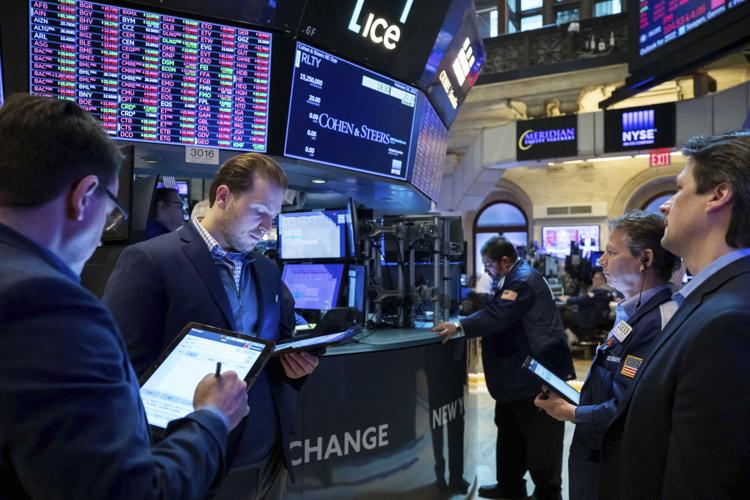On Thursday, oil prices and global financial markets fluctuated drastically in response to Russia’s invasion of Ukraine, heightening concerns about the possibility of an even broader economic disaster in the wake of the attack.
Wall Street began the day with a steep loss, following in the footsteps of European and Asian stock markets before regaining its footing. By the time the New York stock market closed, the S&P 500 had recovered from its early losses and finished with a 1.5 percent gain.
While oil prices briefly rose beyond $105 a barrel and European natural gas contracts climbed more than 50%, energy prices dipped when Vice President Biden said that the United States and other countries were exploring a joint release of oil from strategic reserves to alleviate the global oil glut.
The vice president made his statements from the White House, where he highlighted the United States’ imposition of “crushing sanctions,” which include shutting off Russia’s top banks and corporations from Western financial markets and limiting U.S. technology exports to Russia.
People started purchasing equities as the day progressed, despite the fact that deeper anxieties remained as the market suffered its early setbacks. The Russia-Ukraine issue has the potential to restrict global economic development to the point of triggering a recession, posing a conundrum for central banks. Their interventions have been successful in reversing several major global stock market falls in the past, but they now have less leeway to manoeuvre.
This is due to the fact that central banks such as the Federal Reserve have already stated their intention to raise interest rates in order to battle inflation. Central bankers find themselves in a difficult position as they attempt to achieve contradictory objectives of slowing the economy in order to bring prices down while also perhaps having to boost the economy in order to avoid a recession.
It was predicted by Capital Economics that a protracted conflict could cause steep price increases in commodities such as oil and natural gas; metals such as nickel; aluminium; palladium; and agricultural staples such as wheat and sunflower oil. The effect of this could spill over into the real economy, raising inflation levels in Europe and the United States by as much as 1.5 percentage points in the coming months, according to the firm. With inflation already over 7.5 percent per year in the United States, the country is in serious trouble.
Even when oil prices fell, they continued to trade at levels not seen since the beginning of 2014. Brent crude oil, the worldwide benchmark, traded slightly below $100 a barrel in New York on Friday afternoon. The price of West Texas Intermediate crude oil rose as well, ending the day at $93 a barrel.
The European markets were the worst impacted, according to the majority of indicators. Holland’s front-month gas futures, which serve as a European benchmark for natural gas, finished the day around 33 percent higher, at 118.50 euros per megawatt-hour, after increasing more than 50 percent in the previous month. Russia supplies more than a third of the gas used by the European Union, with part of that gas passing via pipes in Ukraine. An average of 15 euros per megawatt-hour was being paid for natural gas a year ago.
While the ultimate objectives of Russian President Vladimir V. Putin are not yet clear, the United States is increasing sanctions in small steps in an attempt to persuade him that the costs of a full-scale invasion and occupation of Ukraine will be too great for Russia to bear, according to Angela E. Stent, a former national intelligence officer for Russia and Eurasia at the National Intelligence Council.
In an online Council on Foreign Affairs conference on Wednesday, Ms. Stent said that Mr. Putin has been pushing for more than a decade for Western recognition of “a Russian sphere of influence in the post-Soviet states,” and she predicted that he would continue to do so unless forced to do so by the United Nations.
Bank stocks sank at a greater rate than the broader market as investors braced themselves for the imposition of fresh penalties. The shares of European banks with the largest Russian operations have plummeted. Raiffeisen of Austria has lost 23 percent of its value, while UniCredit of Italy has lost 13.5 percent and Société Générale of France has lost around 12 percent. In the United States, JPMorgan Chase lost around 2.8 percent of its value, while Citigroup lost almost 4 percent.
Despite the fact that energy stocks declined on Thursday, they have been a bright light for investors who purchased them in 2022. Energy is the only sector in the S&P 500 that has gained ground this year, with a gain of more than 19 percent. Some of the major fossil fuel companies that have risen more than 20% in value since the beginning of 2022 include Halliburton, Occidental Petroleum, Marathon Oil, Hess, and Exxon Mobil, among others.
Bond yields, which move in the opposite direction of bond prices, decreased as a result of the decline in bond prices. After reaching a high of 2.045 percent on February 15, the yield on the benchmark 10-year Treasury declined to a low of 1.96 percent on February 16.
As for the price of gold, which had been trading below $1,770 an ounce in November, it climbed to $1,924 an ounce at one point in New York before tumbling to $1,899. According to Mr. Rosenberg, “gold has always been one of the places you want to go when there is a crisis.”

